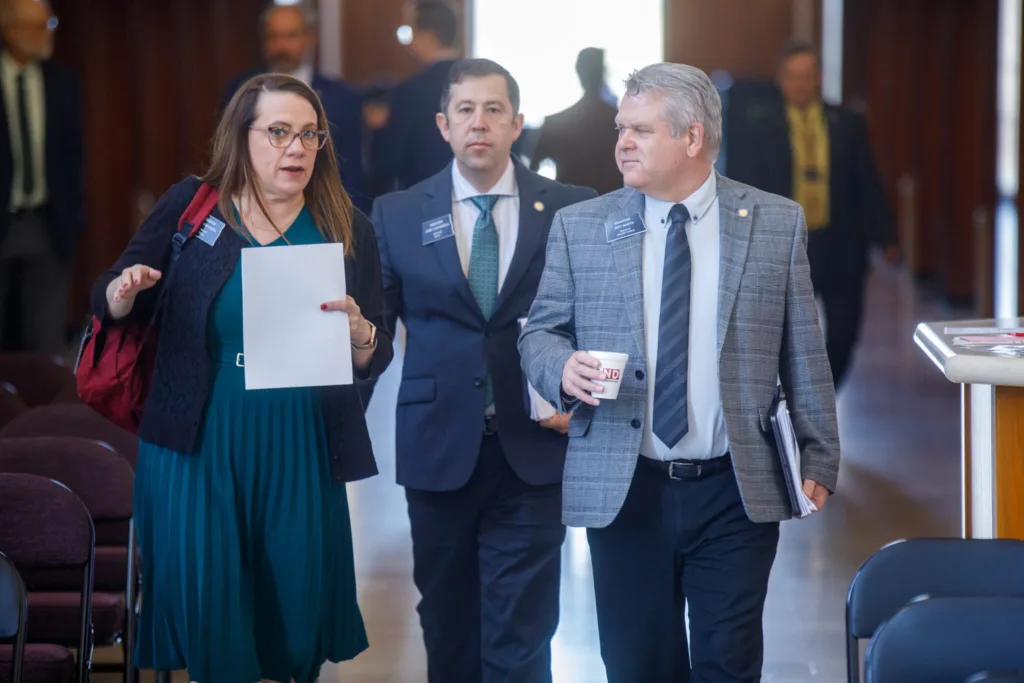

By: Mary Steurer (ND Monitor)
A stripped-down campaign finance bill failed in the Senate early Saturday morning after a prolonged disagreement between chambers.
House Bill 1377 was the last bill on the House and Senate floor for the 2025 legislative session. Some lawmakers hoped it would be a vehicle for ambitious changes in campaign spending transparency, as well as for streamlining financial disclosure regulations for candidates.
It would have taken effect at the same time as the launch of the North Dakota Secretary of State’s Office’s new campaign finance system.
“We had a real opportunity this year with the new software coming in to take a big step forward in our campaign finance transparency and unfortunately, we failed,” said Sen. Kristin Roers, R-Fargo, who sat on the conference committee appointed to workshop the bill.
A conference committee of six lawmakers met several times throughout the day to work out differences over the bill. The committee ultimately decided against including a handful of transparency-related proposals in the legislation.
Dissatisfied with what the committee advanced to the floor, Roers ultimately asked the Senate to reject the proposal when it got to the floor about 3:45 a.m. Saturday. It failed 5-39.
The House, meanwhile, gave the bill a favorable 65-25 vote. Rep. Dan Ruby, R, Minot, who sponsored House Bill 1377, said the bill deserved to pass even if some lawmakers wished it had done more for campaign finance transparency.
“This is still a good bill,” he said.
House Bill 1377 sought to incentivize campaign reporting compliance by increasing late fees and making info about late filers public online.
“If you are late with fines or amendments in the future, that information will be posted on the Secretary of State’s website,” said Rep. Vicky Steiner, R-Dickinson, who carried the bill on the floor Saturday morning.
Other changes highlighted by Steiner included inflationary adjustments to campaign contribution reporting thresholds, and updating state law to reflect an Attorney General’s Opinion related to federal political action committees.
The bill sought to revive some components of Senate Bill 2156, which failed upon its second visit to the Senate floor earlier this session after significant amendments by the House.
A Senate committee led by Roers had voted to fold elements of Senate Bill 2156 into House Bill 1377 — causing consternation among some lawmakers in the House. The Senate approved the changes, though the House voted last week not to concur with the amendments.
The conference committee discussed, though ultimately rejected, several transparency-related provisions.
One was to publicize candidates’ beginning and ending campaign fund balances. Lawmakers also considered making itemized campaign expenditures available to the public. North Dakota already makes campaign contributions above $200 public.
Some legislators on the committee were skeptical the additional information would be useful.
Steiner said during a Friday meeting that full campaign spending information should not be publicized because it can be weaponized against candidates — especially in small communities.
“My rural legislators are concerned about someone saying, ‘You bought from Joe and you didn’t buy from me, Bill,’” she said during the meeting.
Rep. Steve Vetter, R-Grand Forks, said he doesn’t think the public is interested in a higher level of detail.
“Nobody’s asking to know which vendors I’m working with or those types of things,” Vetter said.
Rep. Emily O’Brien, R-Grand Forks, told her colleagues on the House floor she was disappointed with the direction the bill had taken. She said she didn’t understand why some lawmakers are reluctant to make more campaign finance data public.
“No one should have to ask,” O’Brien said.
Gov. Kelly Armstrong, who spoke with reporters early Saturday about some of the final bills of the session, said he doesn’t think citizen lawmakers should be required to report the same level of financial disclosures as congressional candidates. But he said the items in House Bill 1377 seemed reasonable.
“I don’t think asking for beginning fund balances and ending fund balances and itemizing your expenses in a campaign are too much to ask of elected officials,” said Armstrong, a former state senator and U.S. House representative.
“I think the more transparency you have, the more trust you get from the public,” he added.
Armstrong last week signed a separate bill that will require North Dakota officials to file financial disclosure forms annually, rather than only when they are appointed or file to run for office. House Bill 1469 also requires the secretary of state to publish the forms online.